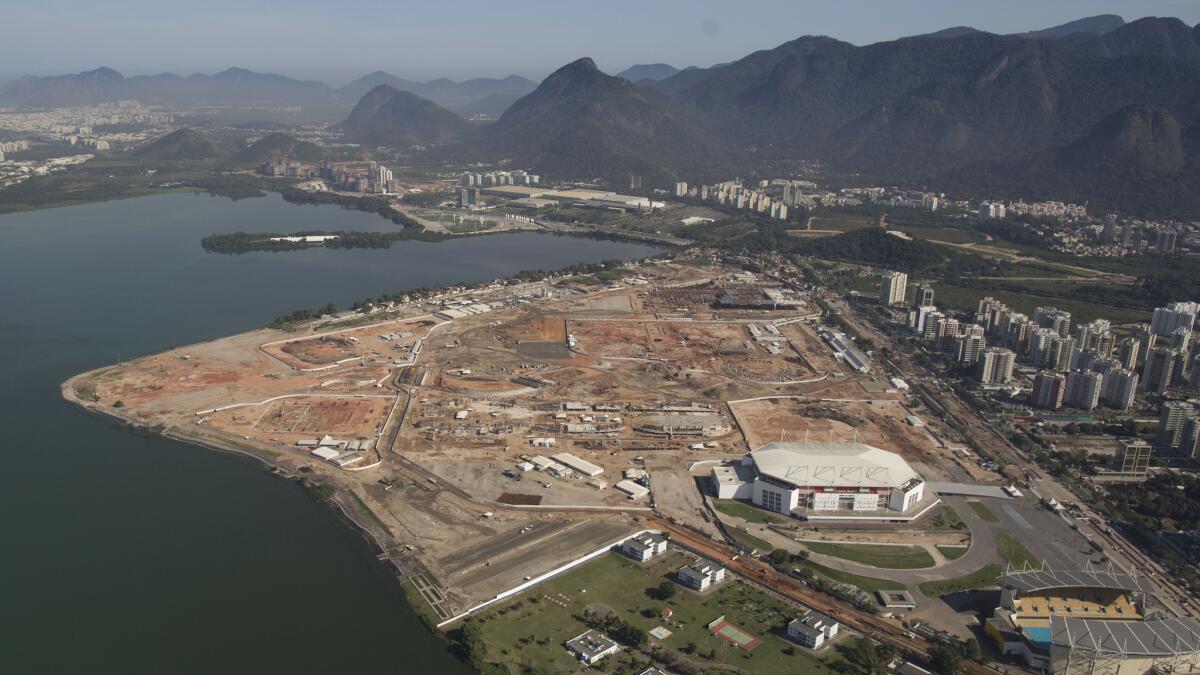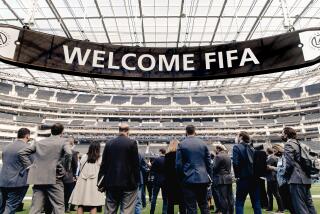After World Cup, Rio de Janeiro shifts focus to Olympics

Brazil’s World Cup was supposed to be a disaster.
Stadiums were not finished, many infrastructure projects never got off the ground, costs, allegedly inflated by corruption, soared for taxpayers and at least 10 workers died during construction projects.
But once the games started most everything fell into place, leading FIFA President Sepp Blatter to call the tournament one of the most successful in history.
With the World Cup in the rearview mirror, Brazil is turning its attention to 2016 and the Rio de Janeiro Olympics, the first Summer Games to be held in South America. And many of the same fears that frightened World Cup organizers are worrying Olympic planners.
With the opening ceremony only two years away, there is still much to be done. Ten of the 16 Olympic venues aren’t scheduled to be completed until late 2015 or early 2016, construction on the Deodoro Sports Complex, site of seven sports, started only two weeks ago, more than two years behind schedule, and Eduardo Paes, the city’s mayor, said Rio de Janeiro will not be able to clean the polluted Guanabara Bay, where the sailing events are scheduled to be held.
Then there’s the spiraling cost of the Games, which now stands at $16 billion, a 23% increase from the original 2009 estimate.
This year, John Coates, a vice president with the International Olympic Committee, called the preparations in Rio de Janeiro the worst he had seen, leading the IOC to appoint executive director Gilbert Felli to monitor preparations. Felli has described the situation as “very tense,” but also said the success of the World Cup has taught Brazilians to “trust in themselves to deliver the Games.”
Roberto Ainbinder, the project director for the Rio Games, is even more optimistic.
“I say with confidence we are on schedule, without problems,” he said this week.
Ainbinder, wearing an ill-fitting plastic construction helmet and rubber boots, stood in the middle of what will be the international broadcast center. Comparisons between the World Cup and the Olympics are misguided, he insisted.
“The planning for the Olympics is totally different from the World Cup,” he said. “We have learned from the World Cup. But for us, the most important example was the Olympics in London in 2012. And Sochi as well.
“With the Olympics, everything is in one city. A lot of different sports every day, 24 hours a day. Totally different.”
Indeed, Rio de Janeiro was the site of only seven World Cup games, including Sunday’s final that was covered by 2,500 reporters. For the Olympics, the city must accommodate more than 10,500 athletes from 200 nations, 45,000 volunteers and about 21,000 media members.
And that doesn’t include the foreign tourists expected to flood the city for the Games. The London Olympics drew about 680,000 overseas visitors.
“For the services of the city, yes there’s a lot of things [that] are the same. Transports, airports, mobility,” Ainbinder said. “We are looking at the experience of the World Cup to apply or not apply the best of the World Cup.”
Much of the Rio Games will be centered on the sprawling Olympic park, which is being constructed on the site of a motorsports complex that once played host to the Brazilian Grand Prix. The neighborhood-sized project, with 3.9 million square feet in the upscale borough of Barra da Tijuca on Rio de Janeiro’s western edge, is the largest of four event clusters spread around the city.
There, 3,000 men, split into double shifts, are working 22 hours per day on 12 venues, the last of which won’t be completed until the spring of 2016. Already there are plans to increase the number of workers to 8,000.
Ainbinder insists that’s planning, not panic. But in Brazil, there’s also something called the “jeitinho Brasileiro,” a phrase to describe always finding a way to get something done, even if it involves ignoring rules or cutting corners.
And that approach troubles IOC members, who note that Rio de Janeiro is further behind than Athens, where preparations for the 2004 Olympics went down to the wire.
The long delay in construction on the Deodoro cluster, a former Army base in working-class North Rio that will play host to fencing, shooting and mountain biking events, plus other sports, is among the biggest worries. Also of concern is the Olympic Stadium, where work to extend the capacity from 45,000 to 60,000 spectators won’t even begin until early 2016.
Then there are fears construction could be disrupted by work stoppages or a delay in financing from Brazil’s three layers of government while a key metro line that will link Olympic sites with the beaches of Copacabana and Ipanema isn’t scheduled to be completed until May 2016.
Brazil is only the fourth country to play host to a World Cup and the Summer Olympics consecutively and the first to try since the U.S., which held the most successful World Cup in history in 1994, followed by the Atlanta Games two years later.
And with Brazil’s World Cup having beaten long odds to finish successfully, the pressure is on the Olympic organizers in Rio de Janeiro to do the same thing.
“We are following the organizing for the World Cup,” Ainbinder said. “I think the people in general were very satisfied with the organizational capacity for the country and the city.
“But we have experience with big events.”
More to Read
Get our high school sports newsletter
Prep Rally is devoted to the SoCal high school sports experience, bringing you scores, stories and a behind-the-scenes look at what makes prep sports so popular.
You may occasionally receive promotional content from the Los Angeles Times.







